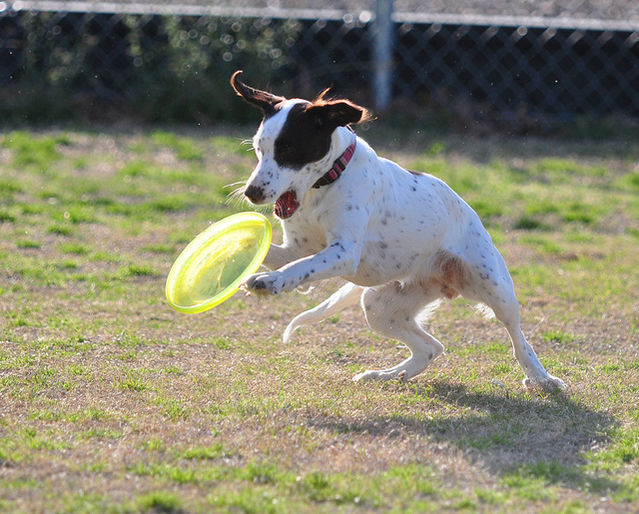What Dogs Do After Training Affects How Much They Remember
Physiological arousal can help consolidate a dog's memories after training.

Source: Robert Hensley photo — Creative Commons license
All of us know that what we do while we are training our dogs makes a difference, specifically whether we use rewards or punishments, how we time or space out training episodes, or how we maintain our dog's attention and interest. However psychologists understand that things going on inside of the body and brain at around the same time, or shortly after an event, can also have an effect on our memories. Experiences which are associated with emotional arousal are remembered with remarkable clarity. Thus most people can remember all of the details of where they were and what they were doing when they learned that the World Trade Center in New York was destroyed. Similarly, a heart stopping car crash, or what went on during our wedding, or perhaps our first time on stage in front of an audience, are all remembered in great detail. In the 1800s the psychologist William James noted "An impression may be so exciting emotionally as to almost leave a scar upon the cerebral tissues." There is now data which suggests that we can use emotional arousal immediately after a dog's training session to help stamp in what the animal has learned.
In a new study that has just been accepted for publication in the journal Physiology & Behavior*, a team of researchers headed by Nadja Affenzeller from the Animal Behaviour, Cognition and Welfare Group in the School of Life Sciences at the University of Lincoln in the UK explored how what happens after sessions of dog training can affect what the dog remembers. For something to be remembered it must be coded by the brain and consolidated into a memory trace that can later be retrieved. A number of studies have shown that when an individual is aroused emotionally there is a release of a number of hormones which may enhance memory consolidation so that things can be better remembered. Most specifically it has been found in laboratory animals that if you administer different drugs and hormones to stimulate arousal (for example amphetamines, adrenaline, or certain corticosteroids) shortly after training this produces a positive effect and makes the learned material more memorable. On the other hand administering drugs that block these arousing hormones reduces the likelihood that the learned material will be remembered.
article continues after advertisement
Obviously the average dog trainer is not going to have a cabinet full
of drugs and hormones which they can use to stimulate the arousal of
their canine student. However any emotionally arousing situation
occurring immediately after a training session can cause the body to
create and secrete such chemicals. One positive way to do this is to
engage in playful activity with the dog.In this current investigation 16 Labrador Retrievers were used. The study was confined to Labrador Retrievers simply to avoid the possibility of breed differences in learning rates. The task was an object discrimination in which the dogs had to learn to select one of two objects which differed in terms of their visual appearance and their scent. The placement of the objects was varied and the dogs were trained in sessions composed of 10 trials each. In between each session the dogs took a brief break in which they were walked outside for a few minutes or were allowed to rest in the waiting area. The dogs were trained to the point where they reached a criterion of 80% or more correct trials in two consecutive 10 trial sessions. Once the dogs reached that level of performance the training stopped. Now the dogs were divided into two groups. A "Play Group" of eight dogs experienced a 30 minute session of intense playful activity consisting of a 10 minute walk, 10 minutes of off lead play (which could include fetching a ball, chasing after Frisbees, or playing tug-of-war depending on each dog's preferred play style), and then a final 10 minute walk. For comparison purposes a "Rest Group" of eight dogs simply spent the 30 minutes after training resting on a dog bed while the researcher engaged their owner in a conversation to prevent further attention or interaction with the dog. However if the dog appeared as if it was going to fall asleep, its name was called or it was touched to prevent them from dozing off. During the play versus rest sessions the heart rate and hormonal content of the dog saliva was monitored to confirm that there were significant differences in physiological arousal in the two groups.
The test for memory that was used by these researchers involves a procedure called "relearning". This consists of retraining the dogs on exactly the same task that they had learned the day before. One usually expects that after an interval following training individuals will come back and not perform as well as they did at the end of the previous day's session. How long it takes to retrain the dog to the same criterion that they had achieved earlier is a fairly sensitive measure of how much the dog remembers. In this case the difference between the two groups is quite clear. The dogs who had received the play session after training relearned the task 40% faster than the dogs who rested after the training sessions (an average number of 26 training trials for the play group versus 43 trials for the rest group). Thus it appears that the playful activity following the teaching sessions helped to consolidate or "stamp in" the memories of what the dogs had learned.
article continues after advertisement
The take-home message from this new research seems to be that the
simple addition of a session of playful activity after a period of
training can significantlyadd to the effectiveness and performance of a
dog who is learning a new set of skills.Stanley Coren is the author of many books including: Gods, Ghosts and Black Dogs; The Wisdom of Dogs; Do Dogs Dream? Born to Bark; The Modern Dog; Why Do Dogs Have Wet Noses? The Pawprints of History; How Dogs Think; How To Speak Dog; Why We Love the Dogs We Do; What Do Dogs Know? The Intelligence of Dogs; Why Does My Dog Act That Way? Understanding Dogs for Dummies; Sleep Thieves; The Left-hander Syndrome
Copyright SC Psychological Enterprises Ltd. May not be reprinted or reposted without permission
* Data from: Nadja Affenzeller, Rupert Palme and Helen Zulch, (2016). Playful activity post-learning improves training performance in Labrador Retriever dogs (Canis lupus familiaris). Physiology & Behavior, doi: 10.1016/j.physbeh.2016.10.014
Source: https://www.psychologytoday.com/blog/canine-corner/201610/what-dogs-do-after-training-affects-how-much-they-remember

No comments:
Post a Comment